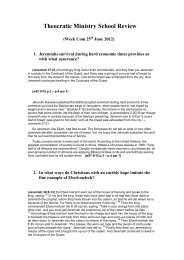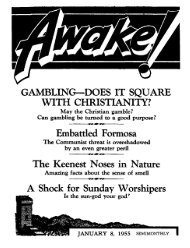1964 Awake! - Theocratic Collector.com
1964 Awake! - Theocratic Collector.com
1964 Awake! - Theocratic Collector.com
You also want an ePaper? Increase the reach of your titles
YUMPU automatically turns print PDFs into web optimized ePapers that Google loves.
MORE persons than<br />
ever before in the<br />
United States say they<br />
are ordained ministers.<br />
The reason for this is<br />
that the number of religious<br />
organizations and<br />
churches has grown, to<br />
some extent due to the<br />
many.splinter groups of<br />
larger denominations<br />
springing IIp.<br />
The ministers of<br />
these various groups<br />
claim that they are<br />
entitled to recognition<br />
under the draft<br />
laws 'of the country<br />
can<br />
you<br />
you<br />
are a<br />
MINISTER?<br />
and to exemption from selective service because<br />
of their ministerial classification.<br />
How does the government of the United<br />
States feel about it? Whom does the Supreme<br />
Court consider to be a minister?<br />
How have other courts in the land ruled<br />
on the matter?<br />
Recognition as a Minister<br />
Under the Universal Military Training<br />
and Service Act, the government considers<br />
a minister to be one who, as his regular<br />
and customary vocation, preaches and<br />
teaches the principles of a religious organization<br />
of which he is a member. It does not<br />
inClude a person who irregularly preaches<br />
and teaches.<br />
The Supreme Court of the United<br />
States, in its decision of November 30,<br />
1953, in the case of Dickinson vs. United<br />
States, gave this view: "The ministerial<br />
exemption, as was pointed out in the Senate<br />
Report ac<strong>com</strong>panying the 1948 Act,<br />
'is a narrow one, intended for the leaders<br />
of the various religious faiths and not for<br />
the members generally.' ... Certainly all<br />
members of a religious organization or<br />
OCTOBER 22, <strong>1964</strong><br />
sect crre not entitled to<br />
the exemption by reason<br />
of their membership,<br />
even thougl1 in<br />
their belief each is a<br />
minister."<br />
In this same opinion,<br />
the Supreme Court added:<br />
"On the other hand,<br />
a legitimate minister<br />
cannot be, for the purposes<br />
of the Act, unfrocked<br />
simply because<br />
all the members of<br />
his sect base an exemption<br />
claim on the<br />
dogma of its faith.<br />
That would leave a<br />
congregation without a cleric. Each registrant<br />
must satisfy the Act's rigid criteria<br />
for the exemption. Preaching and teaching<br />
the principles of one's sect, if performed<br />
part-time or half-time, occasionally<br />
or irregularly, are insufficient ... These<br />
activities must be regularly performed.<br />
They must, as the statute reads, <strong>com</strong>prise<br />
the registrant's 'vocation.' And since the<br />
ministerial exemption is a matter of legislative<br />
grace, the selective service registrant<br />
bears the burden of clearly establishing<br />
a right to the exemption."<br />
Secular Employment<br />
What the Supreme Court then stated is<br />
of great interest: "The statutory definition<br />
of a 'regular or duly ordained minister'<br />
does not preclude all secular employment.<br />
Many preachers, including those in the<br />
more traditional and orthodox sects, may<br />
not be blessed with congregations or parishes<br />
capable of paying them a living wage.<br />
A statutory ban on all secular work would<br />
mete out draft exemptions with an uneven<br />
hand, to the detriment of those who minister<br />
to the poor and thus need some secular<br />
work in order to survive."<br />
13




